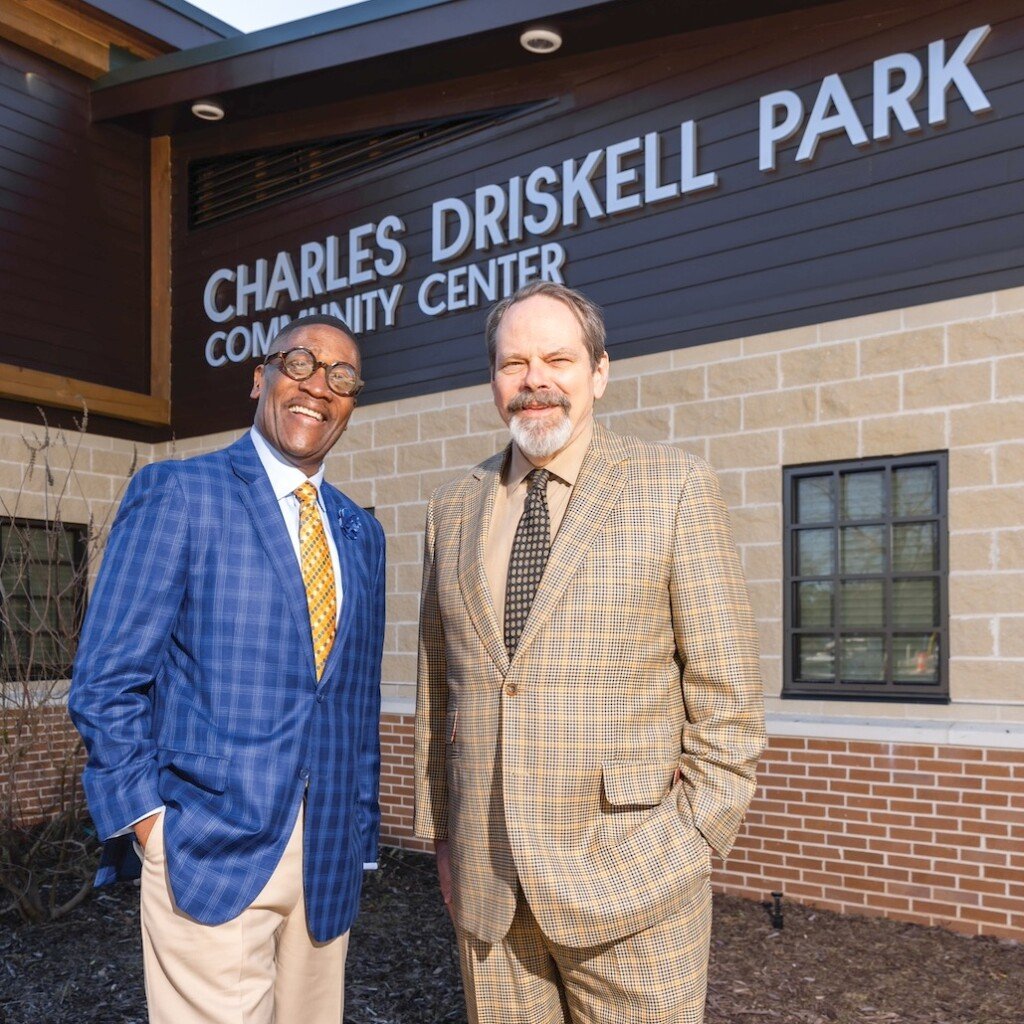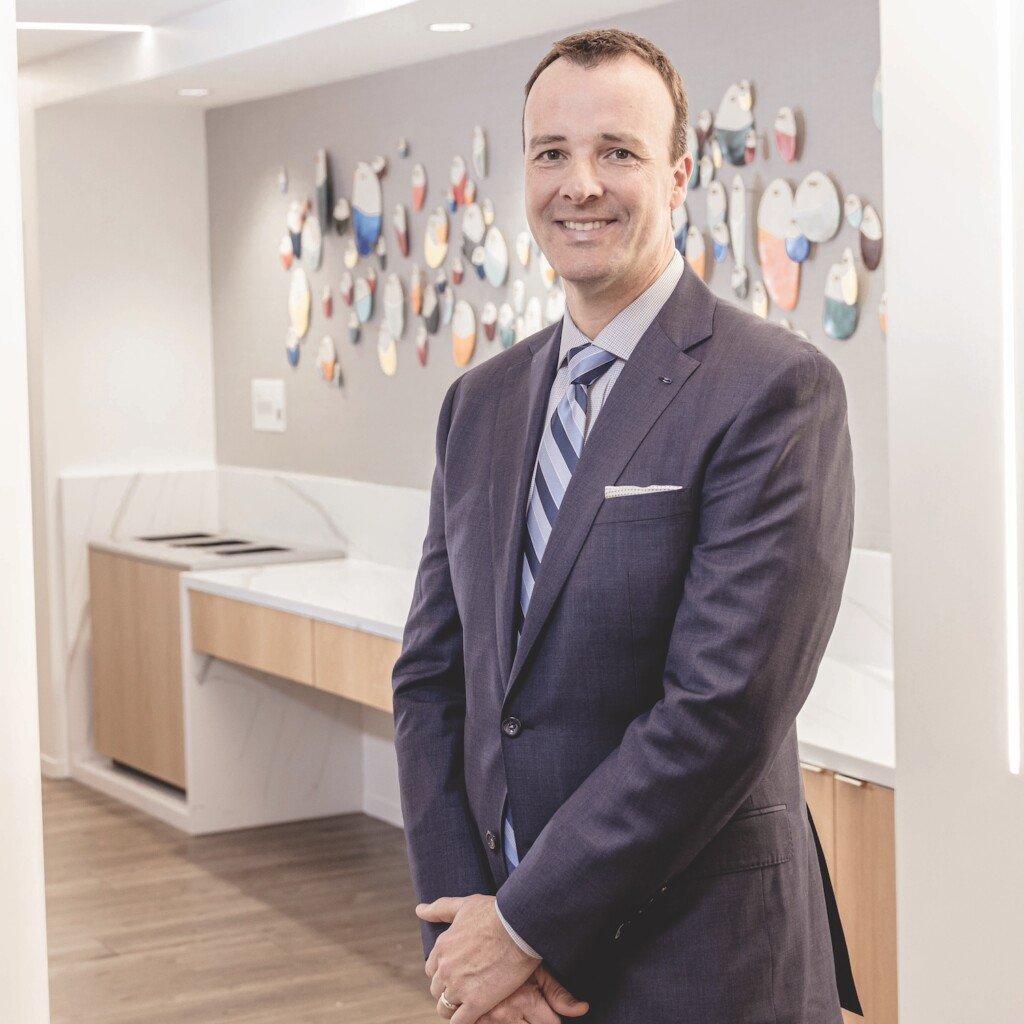Leading the Change
Six women in Georgia are making a difference in the world.
Ask 10 people what makes a good leader and you’ll get 10 different answers. But more often than not, words like transparency, open communication and collaboration find their way into the conversation. For these six women who are considered leaders in their field here in Georgia – including healthcare, telecommunications, hospitality, education and manufacturing – leading with a sense of authenticity is also key.
Whether it’s committing to climate action, helping people facing a crisis or addressing health disparities around the state, these women are looking for ways to make our world a better place in a way that rings true to them personally and to the organizations they lead.
Getting Comfortable with Change
There’s one thing Comcast Central Division President Christine Whitaker wants the next generation of leaders to know: It’s important to get comfortable with being uncomfortable. That’s because true change and growth come with sitting in that awkward and disquieting state.
“As a leader, it is my job to inspire – helping others see the long-term vision, not [just] the immediate tasks of the day,” she says. “With this perspective comes the challenge of helping others understand and get comfortable with change.”
And in an industry that has had to pivot and respond to new innovations and challenges, getting comfortable with change is imperative for success.
“It is no secret that the world of telecommunications is undergoing a remarkable transformation,” she says, adding that convergence – merging multiple technologies and services into a single platform – is ushering in a new era. “Integrating communications, TV, internet and mobile will streamline operations, reduce costs and, most importantly, enhance customer experiences.”
“As a leader, it is my job to inspire – helping others see the long-term vision, not [just] the immediate tasks of the day. With this perspective comes the challenge of helping others understand and get comfortable with change.” Christine Whitaker, central division president, Comcast
Whitaker oversees Comcast’s Central Division and its nearly 16,000 employees from its headquarters in Atlanta, offering video, high-speed
internet, voice, home security and mobile services to more than 21 million customers across 12 states, from Florida to Illinois.
When it comes to leadership, the key word for her is “trust.”
“Without trust and the security that comes from a trusted environment, you create a culture of one-sided thinking and stale execution,” she says. “My hope is that they see me as inspiring, inclusive, collaborative – and not afraid to jump in and serve where needed.”
She wants to inspire others in their leadership journey, encouraging them to have a growth mindset – to be curious and committed to constant learning – to surround themselves with a go-to group of experienced leaders to help them navigate career challenges and opportunities and be mobile and open to tough assignments.
Whitaker has been honored with numerous awards for her leadership over her 25-year career in the cable industry, including being named one of the Most Powerful Women in Cable by CableFax magazine. She’s also a graduate of the prestigious Betsy Magness Leadership Institute of Women in Cable Telecommunications.
Serving With Grace
What started out as an effort to help one man in 2013 has turned into something that today is helping thousands of foodservice workers in crisis across the country.
When 35-year-old Atlanta chef Ryan Hidinger was diagnosed with stage 4 cancer more than 10 years ago, the local restaurant community rallied behind him and his wife Jen to provide financial and moral support. The couple wanted to pay such kindness forward, and Giving Kitchen was born.
After Ryan died in 2014, Jen Hidinger-Kendrick decided to embrace the deeply personal and painful experience and use it to motivate and empower others, guiding Giving Kitchen with “transparency, honesty and grace,” she says. “Leadership is a lot about resilience and being able to listen.”
The restaurant and foodservice industry is Georgia’s second biggest private-sector employer behind agribusiness, employing nearly 500,000 people. Yet many live paycheck to paycheck and don’t have decent health insurance. When a crisis hits – a car accident, a house fire, the death of a family member – it can lead to a spiral of financial struggles. That’s when Giving Kitchen steps in.
Giving Kitchen provides direct financial support and connects people to resources in their community through its Stability Network to address mental health, substance misuse, wellness, employment, housing and utilities, and family and social services issues.
So far, the nonprofit has helped more than 16,000 people, providing more than $10 million in financial support. In 2023 alone, it awarded more than $3.1 million to more than 1,100 foodservice workers. And that need shows no signs of slowing down. Today, every 39 minutes a foodservice worker asks for help from Giving Kitchen.
Its efforts have not gone unnoticed; in 2019 Giving Kitchen received the Humanitarian of the Year Award from the James Beard Foundation. Since then, it has expanded its services to Tennessee and North Carolina and slowly begun helping foodservice workers in crisis around the country.
“When we were sitting there in 2013 thinking about what this not-for-profit could be, there was the understanding that this is far beyond just this amazing city of Atlanta,” Hidinger-Kendrick says.
“It’s for everyone,” she adds. “It does not matter the color of your skin, where you work, your religious status, your political [viewpoint], whatever it is, we are here to help you no matter what.”
Creative Visionary
When the Savannah College of Art and Design (SCAD) was founded in 1978, it had just 71 students and seven employees operating out of a single building. But President Paula Wallace had big plans for the tiny art school.
“I wanted to create something that didn’t exist in the Southeast: an elite, best-in-class art and design college. Why should our region’s most brilliant talents have to travel thousands of miles to study far from home?” she says.
That idea seemed strange at the time. “Careers in the arts? It was like someone suggesting that cars could run on electricity. Impossible!” she recalls. “SCAD broke the mold.”
Today it’s a global leader of applied research with more than 100 degree programs at three campuses and online, along with nearly 60,000 alumni working in creative careers across the world. It has been recognized as among the best in the country for programs including interior design, animation, fashion and film, and its students have racked up a slew of awards in recent years.
“My vision became reality,” she says, “and in the decades since, we have evolved and specialized to benefit our students and surpass the expectations of our industry partners.”
Wallace says those partners include big names like Disney, L’Oréal and Google, which work with SCAD to create cutting-edge degrees. She’s also created events to help launch student careers such as the SCAD Savannah Film Festival – the largest university-run film festival in the world – and SCAD Fashion Show.
There’s also SCADpro – a collaborative design studio where students work with businesses to find creative solutions to real-world challenges – and SCAD SERVE, a community service initiative that aims to solve local and global challenges in food, shelter, clothing and the environment.
A lifelong educator, Wallace also has an award-winning podcast and is a published author. Her most recent book, Lessons in Leadership, includes “wisdom I can share with others,” she says, including how to generate fresh ideas and wield positive influence.
“Whatever leadership role you aspire to, the idea in your head of what the job requires of you is very likely too narrow,” she says. “Being a leader means embracing all of it, wearing all the hats, rolling up your sleeves and getting in the trenches with your people, every day.”
On the Move
With a focus on sustainability and wellness and a commitment to create American-made products, the Buford-based shoe manufacturer Okabashi was founded in 1984 on the principle of doing good in the world.
Those values hold true today, thanks to Sara Irvani, the third generation to lead the company when she became CEO in 2017, before shifting into the role of board director in 2023.
Okabashi makes stylish sandals and flip-flops that are vegan BPA, latex and phthalate free; machine washable; and sustainable. Each pair is made in America with 40% U.S.-grown soy and 25% recycled materials. (Overall, only 1% of shoes today are made in the U.S.) The company sells more than 1.2 million pairs a year – and when customers are ready for a new pair, they can send the old pair back for Okabashi to grind up and reuse in new products, saving nearly 100 tons of scrap material from landfills each year.
“It’s important to leave the world a better place than how we found it,” Irvani says. “That comes down to how you treat people and how you treat the environment.”
It partners with Soles4Souls, a nonprofit that gives shoes to those in need, whether they are facing financial struggles, surviving a natural disaster or battling cancer, both in the U.S. and throughout the world. Over the past 10 years, Okabashi has given more than 8,000 pairs of shoes to those in need, basically anyone “for whom a boost would be meaningful,” Irvani says.
She has a collaborative leadership style and values input from every employee, no matter what their job title.
“If you can leverage everyone’s insights, then of course an organization is going to be strong,” she says. “We just work with really good people, and we’re doing things differently.”
It’s been a challenge, but Irvani has shown that you can care about the planet and do right by your employees, and you can also be profitable.
“Do good things and good things will come back,” she says. “That it also is a testament to the power of positivity.”
Addressing Health Disparities
Kim Funderburk sees her job as providing not just insurance to colleges, local government and hospital employees, but also a chance to address health disparities, equity and health literacy in the state she calls home.

Kim Funderburk, Cigna Healthcare President for Government Education and Health Systems, photo Ben Rollins.
“Georgia is in my blood,” says Funderburk, Cigna Healthcare’s president for government, education and health systems. “It’s always been important to me to give back to a community that has supported me so much.”
Funderburk says so many people suffer from diseases that could be prevented, not just with better access to care but to information so they can make more informed decisions about their health. She sees her job as helping to figure out the missing pieces and make changes to address the health inequities that exist.
“I have an opportunity to engage in the communities and look for those social gaps and disparities and be able to then align some of our services, initiatives and funds through our foundation in support of some of those gaps.”
To help suss out those needs, she sponsors the Health Disparities Advisory Council, made up of Cigna employees and clients like Morehouse School of Medicine and Spelman College, according to Funderburk.
“That work is so important,” she adds. “They have firsthand experience and knowledge of what their populations are going through, and they can help guide us, really tell us what they’re hearing, what may be gaps in the services we are providing. That can help inform us on ways in which we can change.”
She says that mental health is one of the most important issues to address in healthcare right now, especially for children and teens. According to the Georgia Department of Behavioral Health and Developmental Disabilities, one in five children has a mental illness that would benefit from treatment, one in eight teens suffers from depression, and half of mental health disorders start by the age of 14.
“More people than ever are in need of behavioral healthcare,” Funderburk says. “The good news is stigma is decreasing, but we recognize that we still have work to do.”
She isn’t driving change alone, either. “Being a leader for me means taking action and breaking barriers,” she says. “But what really matters is inspiring and motivating and empowering others to unleash their full potential.”
Sustainable Innovator
When you talk to Laurel Hurd, prepare to be floored.
As CEO of Interface since 2022, she’s leading the charge to not just reduce the company’s environmental impact but become a carbon-negative enterprise by 2040.
In other words, the Atlanta-based flooring company aims to not just zero out its carbon footprint but conserve and sequester more carbon than its manufacturing process emits.
To do that, Interface is quite literally weaving sustainability into everything it does. In 2022, it became the first and only flooring manufacturer to attain a third-party Carbon Neutral Enterprise certification, which means every aspect of its business, from how its manufacturing facilities are run to the products it makes for hotels, restaurants, hospitals and homes around the world, is carbon neutral.
“We’re incredibly committed to doing right by the planet,” Hurd says.
That commitment to sustainability “is in our DNA,” she says, noting that Interface was founded in 1973 by Ray C. Anderson, a pioneer in industrial ecology and environmental stewardship.
Being a sustainability leader in an industry once known for consuming huge amounts of fossil fuel and creating tons of waste during the manufacturing process can be a challenge, but Hurd believes that if flooring manufacturers can do it, it’s possible for every company in any industry to find a way to be carbon negative.
“We’ve got a really good, thoughtful roadmap” to attain that goal, Hurd says. “It’s going to come through innovation, whether that’s taking some of what we’ve learned with our carbon-negative carpet tiles and adapting that into different forms, [or] continuing with bio-based materials.”
For its efforts, last year the company was named to the TIME100 Most Influential Companies in its Pioneer category, the only flooring manufacturer on the list.
“Everyone at Interface just wants to do good things,” Hurd says. “So many companies are searching for their purpose, and Interface has it through and through – to do good for the planet but also be a thriving, profitable company. The balance of that every day, everyone showing up, trying to do that, it’s a very, very special place.”











